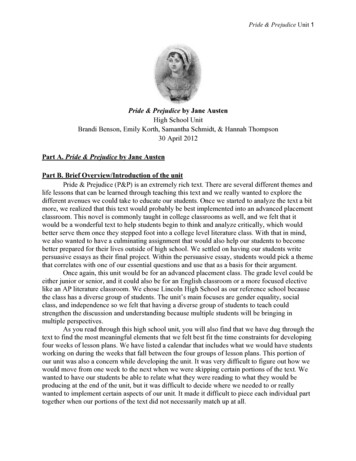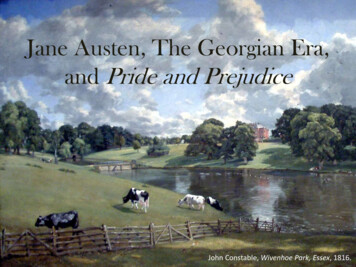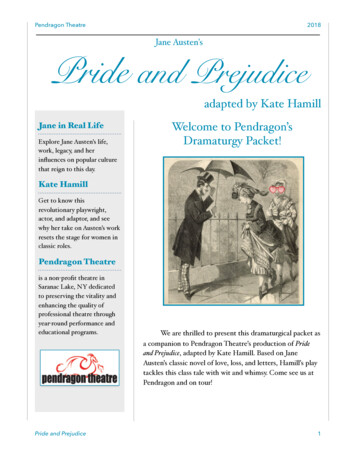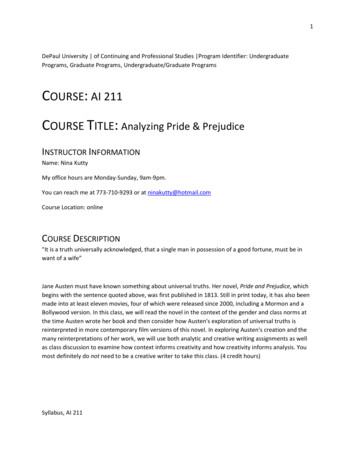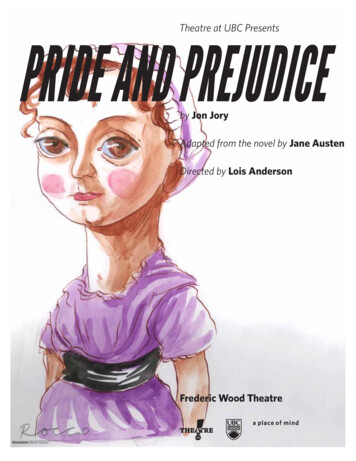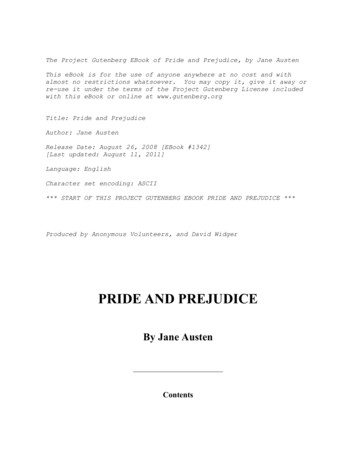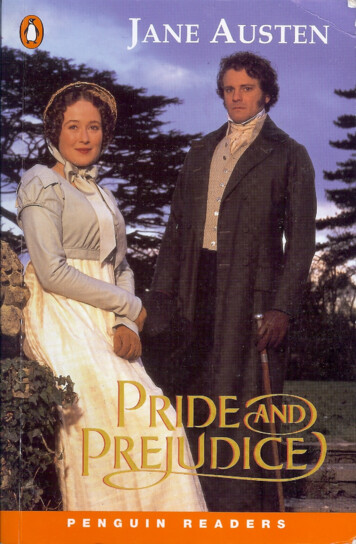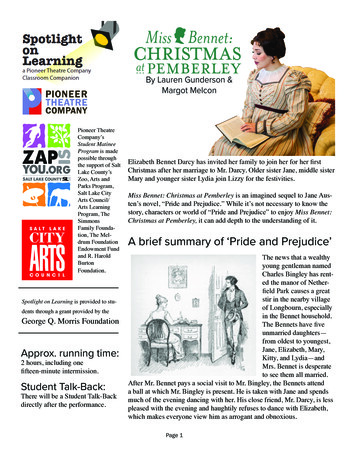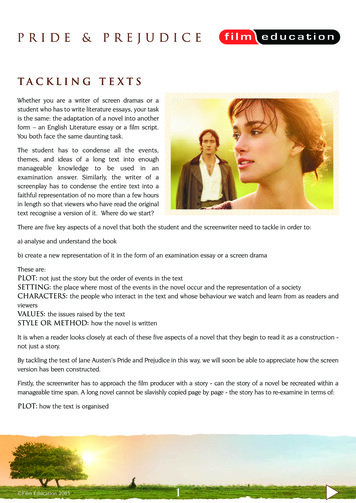
Transcription
Pride and Prejudice by Jane AustenPride and Prejudice by Jane AustenPride and Prejudiceby Jane AustenChapter 1It is a truth universally acknowledged, that a single man inpossession of a good fortune, must be in want of a wife.However little known the feelings or views of such a man maybe on his first entering a neighbourhood, this truth is so wellfixed in the minds of the surrounding families, that he is consideredthe rightful property of some one or other of their daughters."My dear Mr. Bennet," said his lady to him one day, "have youheard that Netherfield Park is let at last?"page 1 / 545
Mr. Bennet replied that he had not."But it is," returned she; "for Mrs. Long has just been here, andshe told me all about it."Mr. Bennet made no answer."Do you not want to know who has taken it?" cried his wifeimpatiently."YOU want to tell me, and I have no objection to hearing it."This was invitation enough."Why, my dear, you must know, Mrs. Long says that Netherfieldis taken by a young man of large fortune from the north ofEngland; that he came down on Monday in a chaise and four tosee the place, and was so much delighted with it, that he agreedwith Mr. Morris immediately; that he is to take possessionbefore Michaelmas, and some of his servants are to be in thehouse by the end of next week.""What is his name?"page 2 / 545
"Bingley.""Is he married or single?""Oh! Single, my dear, to be sure! A single man of largefortune; four or five thousand a year. What a fine thing for ourgirls!""How so? How can it affect them?""My dear Mr. Bennet," replied his wife, "how can you be sotiresome! You must know that I am thinking of his marryingone of them.""Is that his design in settling here?""Design! Nonsense, how can you talk so! But it is very likelythat he MAY fall in love with one of them, and therefore youmust visit him as soon as he comes.""I see no occasion for that. You and the girls may go, or youmay send them by themselves, which perhaps will be stillbetter, for as you are as handsome as any of them, Mr. Bingleymay like you the best of the party."page 3 / 545
"My dear, you flatter me. I certainly HAVE had my share ofbeauty, but I do not pretend to be anything extraordinary now.When a woman has five grown-up daughters, she ought to giveover thinking of her own beauty.""In such cases, a woman has not often much beauty to think of.""But, my dear, you must indeed go and see Mr. Bingley whenhe comes into the neighbourhood.""It is more than I engage for, I assure you.""But consider your daughters. Only think what an establishmentit would be for one of them. Sir William and Lady Lucas aredetermined to go, merely on that account, for in general, youknow, they visit no newcomers. Indeed you must go, for it willbe impossible for US to visit him if you do not.""You are over-scrupulous, surely. I dare say Mr. Bingley willbe very glad to see you; and I will send a few lines by you toassure him of my hearty consent to his marrying whichever hechooses of the girls; though I must throw in a good word formy little Lizzy."page 4 / 545
"I desire you will do no such thing. Lizzy is not a bit betterthan the others; and I am sure she is not half so handsome asJane, nor half so good-humoured as Lydia. But you are alwaysgiving HER the preference.""They have none of them much to recommend them," replied he;"they are all silly and ignorant like other girls; but Lizzyhas something more of quickness than her sisters.""Mr. Bennet, how CAN you abuse your own children in such away? You take delight in vexing me. You have no compassionfor my poor nerves.""You mistake me, my dear. I have a high respect for yournerves. They are my old friends. I have heard you mentionthem with consideration these last twenty years at least."Mr. Bennet was so odd a mixture of quick parts, sarcastic humour,reserve, and caprice, that the experience of three-and-twentyyears had been insufficient to make his wife understand hischaracter. HER mind was less difficult to develop. She was awoman of mean understanding, little information, and uncertaintemper. When she was discontented, she fancied herself nervous.The business of her life was to get her daughters married; itssolace was visiting and news.page 5 / 545
Chapter 2Mr. Bennet was among the earliest of those who waited on Mr.Bingley. He had always intended to visit him, though to the lastalways assuring his wife that he should not go; and till theevening after the visit was paid she had no knowledge of it.It was then disclosed in the following manner. Observing hissecond daughter employed in trimming a hat, he suddenlyaddressed her with:"I hope Mr. Bingley will like it, Lizzy.""We are not in a way to know WHAT Mr. Bingley likes," saidher mother resentfully, "since we are not to visit.""But you forget, mamma," said Elizabeth, "that we shall meethim at the assemblies, and that Mrs. Long promised to introducehim.""I do not believe Mrs. Long will do any such thing. She has twonieces of her own. She is a selfish, hypocritical woman, and Ihave no opinion of her."page 6 / 545
"No more have I," said Mr. Bennet; "and I am glad to find thatyou do not depend on her serving you."Mrs. Bennet deigned not to make any reply, but, unable tocontain herself, began scolding one of her daughters."Don't keep coughing so, Kitty, for Heaven's sake! Have a littlecompassion on my nerves. You tear them to pieces.""Kitty has no discretion in her coughs," said her father; "shetimes them ill.""I do not cough for my own amusement," replied Kitty fretfully."When is your next ball to be, Lizzy?""To-morrow fortnight.""Aye, so it is," cried her mother, "and Mrs. Long does not comeback till the day before; so it will be impossible for her tointroduce him, for she will not know him herself.""Then, my dear, you may have the advantage of your friend, andintroduce Mr. Bingley to HER."page 7 / 545
"Impossible, Mr. Bennet, impossible, when I am not acquaintedwith him myself; how can you be so teasing?""I honour your circumspection. A fortnight's acquaintance iscertainly very little. One cannot know what a man really is bythe end of a fortnight. But if WE do not venture somebody elsewill; and after all, Mrs. Long and her daughters must stand theirchance; and, therefore, as she will think it an act of kindness,if you decline the office, I will take it on myself."The girls stared at their father. Mrs. Bennet said only,"Nonsense, nonsense!""What can be the meaning of that emphatic exclamation?" criedhe. "Do you consider the forms of introduction, and the stressthat is laid on them, as nonsense? I cannot quite agree withyou THERE. What say you, Mary? For you are a young lady ofdeep reflection, I know, and read great books and make extracts."Mary wished to say something sensible, but knew not how."While Mary is adjusting her ideas," he continued, "let us returnto Mr. Bingley."page 8 / 545
"I am sick of Mr. Bingley," cried his wife."I am sorry to hear THAT; but why did not you tell me thatbefore? If I had known as much this morning I certainly wouldnot have called on him. It is very unlucky; but as I haveactually paid the visit, we cannot escape the acquaintance now."The astonishment of the ladies was just what he wished; that ofMrs. Bennet perhaps surpassing the rest; though, when the firsttumult of joy was over, she began to declare that it was what shehad expected all the while."How good it was in you, my dear Mr. Bennet! But I knew I shouldpersuade you at last. I was sure you loved your girls too wellto neglect such an acquaintance. Well, how pleased I am! and itis such a good joke, too, that you should have gone this morningand never said a word about it till now.""Now, Kitty, you may cough as much as you choose," said Mr.Bennet; and, as he spoke, he left the room, fatigued with theraptures of his wife."What an excellent father you have, girls!" said she, when thedoor was shut. "I do not know how you will ever make himamends for his kindness; or me, either, for that matter. At ourpage 9 / 545
time of life it is not so pleasant, I can tell you, to be makingnew acquaintances every day; but for your sakes, we would doanything. Lydia, my love, though you ARE the youngest, I daresay Mr. Bingley will dance with you at the next ball.""Oh!" said Lydia stoutly, "I am not afraid; for though I AM theyoungest, I'm the tallest."The rest of the evening was spent in conjecturing how soon hewould return Mr. Bennet's visit, and determining when theyshould ask him to dinner.Chapter 3Not all that Mrs. Bennet, however, with the assistance of herfive daughters, could ask on the subject, was sufficient to drawfrom her husband any satisfactory description of Mr. Bingley.They attacked him in various ways--with barefaced questions,ingenious suppositions, and distant surmises; but he eluded theskill of them all, and they were at last obliged to accept thesecond-hand intelligence of their neighbour, Lady Lucas. Herreport was highly favourable. Sir William had been delightedwith him. He was quite young, wonderfully handsome, extremelyagreeable, and, to crown the whole, he meant to be at the nextassembly with a large party. Nothing could be more delightful!To be fond of dancing was a certain step towards falling in love;page 10 / 545
and very lively hopes of Mr. Bingley's heart were entertained."If I can but see one of my daughters happily settled atNetherfield," said Mrs. Bennet to her husband, "and all theothers equally well married, I shall have nothing to wish for."In a few days Mr. Bingley returned Mr. Bennet's visit, and satabout ten minutes with him in his library. He had entertainedhopes of being admitted to a sight of the young ladies, ofwhose beauty he had heard much; but he saw only the father.The ladies were somewhat more fortunate, for they had theadvantage of ascertaining from an upper window that he worea blue coat, and rode a black horse.An invitation to dinner was soon afterwards dispatched; andalready had Mrs. Bennet planned the courses that were to docredit to her housekeeping, when an answer arrived whichdeferred it all. Mr. Bingley was obliged to be in town thefollowing day, and, consequently, unable to accept the honourof their invitation, etc. Mrs. Bennet was quite disconcerted.She could not imagine what business he could have in town sosoon after his arrival in Hertfordshire; and she began to fearthat he might be always flying about from one place to another,and never settled at Netherfield as he ought to be. Lady Lucasquieted her fears a little by starting the idea of his being goneto London only to get a large party for the ball; and a reportpage 11 / 545
soon followed that Mr. Bingley was to bring twelve ladies andseven gentlemen with him to the assembly. The girls grievedover such a number of ladies, but were comforted the daybefore the ball by hearing, that instead of twelve he broughtonly six with him from London--his five sisters and a cousin.And when the party entered the assembly room it consisted ofonly five altogether--Mr. Bingley, his two sisters, the husbandof the eldest, and another young man.Mr. Bingley was good-looking and gentlemanlike; he had a pleasantcountenance, and easy, unaffected manners. His sisters were finewomen, with an air of decided fashion. His brother-in-law, Mr.Hurst, merely looked the gentleman; but his friend Mr. Darcy soondrew the attention of the room by his fine, tall person, handsomefeatures, noble mien, and the report which was in generalcirculation within five minutes after his entrance, of his havingten thousand a year. The gentlemen pronounced him to be a finefigure of a man, the ladies declared he was much handsomer thanMr. Bingley, and he was looked at with great admiration for abouthalf the evening, till his manners gave a disgust which turnedthe tide of his popularity; for he was discovered to be proud;to be above his company, and above being pleased; and not all hislarge estate in Derbyshire could then save him from having a mostforbidding, disagreeable countenance, and being unworthy to becompared with his friend.Mr. Bingley had soon made himself acquainted with all thepage 12 / 545
principal people in the room; he was lively and unreserved,danced every dance, was angry that the ball closed so early,and talked of giving one himself at Netherfield. Such amiablequalities must speak for themselves. What a contrast betweenhim and his friend! Mr. Darcy danced only once with Mrs. Hurstand once with Miss Bingley, declined being introduced to anyother lady, and spent the rest of the evening in walking aboutthe room, speaking occasionally to one of his own party. Hischaracter was decided. He was the proudest, most disagreeableman in the world, and everybody hoped that he would never comethere again. Amongst the most violent against him was Mrs.Bennet, whose dislike of his general behaviour was sharpenedinto particular resentment by his having slighted one of herdaughters.Elizabeth Bennet had been obliged, by the scarcity of gentlemen,to sit down for two dances; and during part of that time,Mr. Darcy had been standing near enough for her to hear aconversation between him and Mr. Bingley, who came from thedance for a few minutes, to press his friend to join it."Come, Darcy," said he, "I must have you dance. I hate to seeyou standing about by yourself in this stupid manner. You hadmuch better dance.""I certainly shall not. You know how I detest it, unless I ampage 13 / 545
particularly acquainted with my partner. At such an assembly asthis it would be insupportable. Your sisters are engaged, andthere is not another woman in the room whom it would not be apunishment to me to stand up with.""I would not be so fastidious as you are," cried Mr. Bingley,"for a kingdom! Upon my honour, I never met with so manypleasant girls in my life as I have this evening; and there areseveral of them you see uncommonly pretty.""YOU are dancing with the only handsome girl in the room,"said Mr. Darcy, looking at the eldest Miss Bennet."Oh! She is the most beautiful creature I ever beheld! Butthere is one of her sisters sitting down just behind you, who isvery pretty, and I dare say very agreeable. Do let me ask mypartner to introduce you.""Which do you mean?" and turning round he looked for amoment at Elizabeth, till catching her eye, he withdrew his ownand coldly said: "She is tolerable, but not handsome enough totempt ME; I am in no humour at present to give consequenceto young ladies who are slighted by other men. You had betterreturn to your partner and enjoy her smiles, for you are wastingyour time with me."page 14 / 545
Mr. Bingley followed his advice. Mr. Darcy walked off; andElizabeth remained with no very cordial feelings toward him.She told the story, however, with great spirit among her friends;for she had a lively, playful disposition, which delighted inanything ridiculous.The evening altogether passed off pleasantly to the wholefamily. Mrs. Bennet had seen her eldest daughter muchadmired by the Netherfield party. Mr. Bingley had danced withher twice, and she had been distinguished by his sisters. Janewas as much gratified by this as her mother could be, though ina quieter way. Elizabeth felt Jane's pleasure. Mary had heardherself mentioned to Miss Bingley as the most accomplishedgirl in the neighbourhood; and Catherine and Lydia had beenfortunate enough never to be without partners, which was allthat they had yet learnt to care for at a ball. They returned,therefore, in good spirits to Longbourn, the village where theylived, and of which they were the principal inhabitants. Theyfound Mr. Bennet still up. With a book he was regardless oftime; and on the present occasion he had a good deal ofcuriosity as to the events of an evening which had raised suchsplendid expectations. He had rather hoped that his wife'sviews on the stranger would be disappointed; but he soonfound out that he had a different story to hear."Oh! my dear Mr. Bennet," as she entered the room, "we havepage 15 / 545
had a most delightful evening, a most excellent ball. I wish youhad been there. Jane was so admired, nothing could be like it.Everybody said how well she looked; and Mr. Bingley thoughther quite beautiful, and danced with her twice! Only think ofTHAT, my dear; he actually danced with her twice! and she wasthe only creature in the room that he asked a second time.First of all, he asked Miss Lucas. I was so vexed to see himstand up with her! But, however, he did not admire her at all;indeed, nobody can, you know; and he seemed quite struck withJane as she was going down the dance. So he inquired who shewas, and got introduced, and asked her for the two next. Thenthe two third he danced with Miss King, and the two fourth withMaria Lucas, and the two fifth with Jane again, and the twosixth with Lizzy, and the BOULANGER--""If he had had any compassion for ME," cried her husbandimpatiently, "he would not have danced half so much! For God'ssake, say no more of his partners. O that he had sprainedhis ankle in the first place!""Oh! my dear, I am quite delighted with him. He is soexcessively handsome! And his sisters are charming women.I never in my life saw anything more elegant than their dresses.I dare say the lace upon Mrs. Hurst's gown--"Here she was interrupted again. Mr. Bennet protested againstpage 16 / 545
any description of finery. She was therefore obliged to seekanother branch of the subject, and related, with much bitternessof spirit and some exaggeration, the shocking rudeness of Mr.Darcy."But I can assure you," she added, "that Lizzy does not losemuch by not suiting HIS fancy; for he is a most disagreeable,horrid man, not at all worth pleasing. So high and so conceitedthat there was no enduring him! He walked here, and he walkedthere, fancying himself so very great! Not handsome enough todance with! I wish you had been there, my dear, to have givenhim one of your set-downs. I quite detest the man."Chapter 4When Jane and Elizabeth were alone, the former, who had beencautious in her praise of Mr. Bingley before, expressed to hersister just how very much she admired him."He is just what a young man ought to be," said she, "sensible,good-humoured, lively; and I never saw such happy manners!--somuch ease, with such perfect good breeding!""He is also handsome," replied Elizabeth, "which a young manought likewise to be, if he possibly can. His character is therebypage 17 / 545
complete.""I was very much flattered by his asking me to dance a secondtime. I did not expect such a compliment.""Did not you? I did for you. But that is one great differencebetween us. Compliments always take YOU by surprise, andME never. What could be more natural than his asking youagain? He could not help seeing that you were about five timesas pretty as every other woman in the room. No thanks to hisgallantry for that. Well, he certainly is very agreeable, and Igive you leave to like him. You have liked many a stupiderperson.""Dear Lizzy!""Oh! you are a great deal too apt, you know, to like people ingeneral. You never see a fault in anybody. All the world aregood and agreeable in your eyes. I never heard you speak ill ofa human being in your life.""I would not wish to be hasty in censuring anyone; but I alwaysspeak what I think.""I know you do; and it is THAT which makes the wonder. With YOURpage 18 / 545
good sense, to be so honestly blind to the follies and nonsenseof others! Affectation of candour is common enough--one meetswith it everywhere. But to be candid without ostentation ordesign--to take the good of everybody's character and make itstill better, and say nothing of the bad--belongs to you alone.And so you like this man's sisters, too, do you? Their mannersare not equal to his.""Certainly not--at first. But they are very pleasing women whenyou converse with them. Miss Bingley is to live with herbrother, and keep his house; and I am much mistaken if we shallnot find a very charming neighbour in her."Elizabeth listened in silence, but was not convinced; theirbehaviour at the assembly had not been calculated to please ingeneral; and with more quickness of observation and less pliancyof temper than her sister, and with a judgement too unassailed byany attention to herself, she was very little disposed to approvethem. They were in fact very fine ladies; not deficient in goodhumour when they were pleased, nor in the power of makingthemselves agreeable when they chose it, but proud andconceited. They were rather handsome, had been educated inone of the first private seminaries in town, had a fortune oftwenty thousand pounds, were in the habit of spending morethan they ought, and of associating with people of rank, andwere therefore in every respect entitled to think well ofthemselves, and meanly of others. They were of a respectablepage 19 / 545
family in the north of England; a circumstance more deeplyimpressed on their memories than that their brother's fortuneand their own had been acquired by trade.Mr. Bingley inherited property to the amount of nearly ahundred thousand pounds from his father, who had intended topurchase an estate, but did not live to do it. Mr. Bingleyintended it likewise, and sometimes made choice of his county;but as he was now provided with a good house and the liberty ofa manor, it was doubtful to many of those who best knew theeasiness of his temper, whether he might not spend theremainder of his days at Netherfield, and leave the nextgeneration to purchase.His sisters were anxious for his having an estate of his own; but,though he was now only established as a tenant, Miss Bingleywas by no means unwilling to preside at his table--nor was Mrs.Hurst, who had married a man of more fashion than fortune, lessdisposed to consider his house as her home when it suited her.Mr. Bingley had not been of age two years, when he was temptedby an accidental recommendation to look at Netherfield House.He did look at it, and into it for half-an-hour--was pleased withthe situation and the principal rooms, satisfied with what theowner said in its praise, and took it immediately.Between him and Darcy there was a very steady friendship, inpage 20 / 545
spite of great opposition of character. Bingley was endeared toDarcy by the easiness, openness, and ductility of his temper,though no disposition could offer a greater contrast to his own,and though with his own he never appeared dissatisfied. On thestrength of Darcy's regard, Bingley had the firmest reliance, andof his judgement the highest opinion. In understanding, Darcywas the superior. Bingley was by no means deficient, but Darcywas clever. He was at the same time haughty, reserved, andfastidious, and his manners, though well-bred, were not inviting.In that respect his friend had greatly the advantage. Bingley wassure of being liked wherever he appeared, Darcy was continuallygiving offense.The manner in which they spoke of the Meryton assembly wassufficiently characteristic. Bingley had never met with morepleasant people or prettier girls in his life; everybody had beenmost kind and attentive to him; there had been no formality, nostiffness; he had soon felt acquainted with all the room; and, asto Miss Bennet, he could not conceive an angel more beautiful.Darcy, on the contrary, had seen a collection of people in whomthere was little beauty and no fashion, for none of whom he hadfelt the smallest interest, and from none received either attentionor pleasure. Miss Bennet he acknowledged to be pretty, but shesmiled too much.Mrs. Hurst and her sister allowed it to be so--but still theyadmired her and liked her, and pronounced her to be a sweetpage 21 / 545
girl, and one whom they would not object to know more of.Miss Bennet was therefore established as a sweet girl, and theirbrother felt authorized by such commendation to think of her ashe chose.Chapter 5Within a short walk of Longbourn lived a family with whomthe Bennets were particularly intimate. Sir William Lucashad been formerly in trade in Meryton, where he had made atolerable fortune, and risen to the honour of knighthood by anaddress to the king during his mayoralty. The distinction hadperhaps been felt too strongly. It had given him a disgustto his business, and to his residence in a small market town;and, in quitting them both, he had removed with his familyto a house about a mile from Meryton, denominated from thatperiod Lucas Lodge, where he could think with pleasure of hisown importance, and, unshackled by business, occupy himselfsolely in being civil to all the world. For, though elated by hisrank, it did not render him supercilious; on the contrary, he wasall attention to everybody. By nature inoffensive, friendly, andobliging, his presentation at St. James's had made him courteous.Lady Lucas was a very good kind of woman, not too clever tobe a valuable neighbour to Mrs. Bennet. They had severalchildren. The eldest of them, a sensible, intelligent youngpage 22 / 545
woman, about twenty-seven, was Elizabeth's intimate friend.That the Miss Lucases and the Miss Bennets should meet totalk over a ball was absolutely necessary; and the morning afterthe assembly brought the former to Longbourn to hear and tocommunicate."YOU began the evening well, Charlotte," said Mrs. Bennet withcivil self-command to Miss Lucas. "YOU were Mr. Bingley'sfirst choice.""Yes; but he seemed to like his second better.""Oh! you mean Jane, I suppose, because he danced with hertwice. To be sure that DID seem as if he admired her--indeedI rather believe he DID--I heard something about it--but Ihardly know what--something about Mr. Robinson.""Perhaps you mean what I overheard between him and Mr. Robinson;did not I mention it to you? Mr. Robinson's asking him how heliked our Meryton assemblies, and whether he did not think therewere a great many pretty women in the room, and WHICH he thoughtthe prettiest? and his answering immediately to the lastquestion: 'Oh! the eldest Miss Bennet, beyond a doubt; therecannot be two opinions on that point.'"page 23 / 545
"Upon my word! Well, that is very decided indeed--that doesseem as if--but, however, it may all come to nothing, you know.""MY overhearings were more to the purpose than YOURS, Eliza,"said Charlotte. "Mr. Darcy is not so well worth listening toas his friend, is he?--poor Eliza!--to be only just TOLERABLE.""I beg you would not put it into Lizzy's head to be vexed byhis ill-treatment, for he is such a disagreeable man, that itwould be quite a misfortune to be liked by him. Mrs. Longtold me last night that he sat close to her for half-an-hourwithout once opening his lips.""Are you quite sure, ma'am?--is not there a little mistake?"said Jane. "I certainly saw Mr. Darcy speaking to her.""Aye--because she asked him at last how he liked Netherfield,and he could not help answering her; but she said he seemedquite angry at being spoke to.""Miss Bingley told me," said Jane, "that he never speaks much,unless among his intimate acquaintances. With THEM he isremarkably agreeable."page 24 / 545
"I do not believe a word of it, my dear. If he had been so veryagreeable, he would have talked to Mrs. Long. But I can guesshow it was; everybody says that he is eat up with pride, and Idare say he had heard somehow that Mrs. Long does not keepa carriage, and had come to the ball in a hack chaise.""I do not mind his not talking to Mrs. Long," said Miss Lucas,"but I wish he had danced with Eliza.""Another time, Lizzy," said her mother, "I would not dancewith HIM, if I were you.""I believe, ma'am, I may safely promise you NEVER to dancewith him.""His pride," said Miss Lucas, "does not offend ME so much aspride often does, because there is an excuse for it. One cannotwonder that so very fine a young man, with family, fortune,everything in his favour, should think highly of himself. If Imay so express it, he has a RIGHT to be proud.""That is very true," replied Elizabeth, "and I could easilyforgive HIS pride, if he had not mortified MINE."page 25 / 545
"Pride," observed Mary, who piqued herself upon the solidityof her reflections, "is a very common failing, I believe. Byall that I have ever read, I am convinced that it is very commonindeed; that human nature is particularly prone to it, andthat there are very few of us who do not cherish a feeling ofself-complacency on the score of some quality or other, realor imaginary. Vanity and pride are different things, thoughthe words are often used synonymously. A person may be proudwithout being vain. Pride relates more to our opinion ofourselves, vanity to what we would have others think of us.""If I were as rich as Mr. Darcy," cried a young Lucas, whocame with his sisters, "I should not care how proud I was. Iwould keep a pack of foxhounds, and drink a bottle of wine aday.""Then you would drink a great deal more than you ought," saidMrs. Bennet; "and if I were to see you at it, I should take awayyour bottle directly."The boy protested that she should not; she continued to declarethat she would, and the argument ended only with the visit.Chapter 6page 26 / 545
The ladies of Longbourn soon waited on those of Netherfield.The visit was soon returned in due form. Miss Bennet'spleasing manners grew on the goodwill of Mrs. Hurst and MissBingley; and though the mother was found to be intolerable,and the younger sisters not worth speaking to, a wish ofbeing better acquainted with THEM was expressed towardsthe two eldest. By Jane, this attention was received with thegreatest pleasure, but Elizabeth still saw superciliousness intheir treatment of everybody, hardly excepting even her sister,and could not like them; though their kindness to Jane, such as itwas, had a value as arising in all probability from the influenceof their brother's admiration. It was generally evidentwhenever they met, that he DID admire her and to HER it wasequally evident that Jane was yielding to the preference whichshe had begun to entertain for him from
Pride and Prejudice by Jane Austen Pride and Prejudice by Jane Austen Pride and Prejudice by Jane Austen Chapter 1 It is a truth universally acknowledged, that a single man in possession of a good fortune, must be in want of a wife. However little known the feelings or views of such a man may be on his first entering a neighbourhood, this truth .
